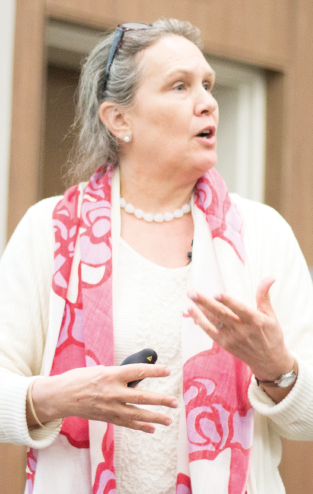
Keynote speakers are invited to Ferris State University because their topics are thought-provoking and important. Sometimes they elicit a variety of emotions.
Students felt “curiosity,” “disappointment,” “sadness,” “shame,” “outrage,” “disgust,” “anger” and were “disturbed” during Debby Irving’s recent visit to Ferris as the keynote speaker of “Radical Curiosity: The Unexplained Pathway to Human Potential.”
Irving, a racial justice writer and speaker, spoke from 11 a.m. to 12:30 p.m. Tuesday, March 21, in University Center Ballroom (UCB) A with a luncheon following in UCB B.
The event was co-sponsored by the Academic Senate, Office of Multicultural Student Services (OMSS), Diversity and Inclusion Office and the Faculty Center for Teaching and Learning.
“We are all born with an amazing amount of curiosity,” Irving said. “But, if I’m so invested in proving what I know, my curiosity dies. I get comfortable with making assumptions.”
Irving grew up in the 60s and 70s in Winchester, Massachusetts, a predominately upper middle -class, white town. Irving was raised with the belief that America was a meritocracy, and was surrounded by stories affirming that belief.
“[Adults] fed me thoughts of what to believe and cut off my curiosity,” Irving said.
According to Irving, human belief systems are formed between five and 10 years old and they stay with us most of our lives. Our view dictates leadership, primarily with presidents, consists of white men of a certain age and social class. Bias is programmed deep in our minds and it can’t be managed if it isn’t acknowledged.
Irving was shocked when she discovered Black Wall Street in Tulsa, Oklahoma. Even having been a history major, she had never heard of the successful area which was bombed to extinction by the government and the Ku Klux Klan (KKK), where white residents shot and stabbed the black residents as they fled.
“I was missing history,” Irving said. “We can’t create equality by design if we don’t understand the inequality and trauma in this country.”
Irving also mentioned the GI Bill of Rights, which, though it did not specifically say it was only for whites, was inaccessible to 1.2 million black soldiers. According to Irving, 98 percent of the $120 billion allocated went to whites, which Irving attributed to the “intergenerational compound of advantage and disadvantage.”
Irving never saw either the inaccessibility of the GI Bill or Black Wall Street in any history books.
“I’m really disappointed in my education,” said Ferris psychology senior Alicia Kelenske. “It’s like I didn’t have an education. Everything I learned was typical white textbook. I feel robbed that I wasn’t given the actual truth.”
Irving urged attendants of the event to do three things: reawaken their radical curiosity, be radically curious about history and be radically curious about their feelings.
“It was very mind-opening,” said Ferris marketing and music industry management freshman Jayden Anderson. “At first, I felt angry, and then I dealt with my emotion and I realized that that was just motivation to go forward and do better.”
“There’s a resistance to digging into [racial struggle] for fear it will make people upset,” Irving said. “But it’s already making people upset.”
Anderson, who is of mixed racial descent, discussed the struggles he has faced.
“I’ve always had to be a chameleon,” Anderson said. “I know how to fit in when I need to, I know how to talk a certain way when I need to and I hate that feeling. I don’t want to talk ‘black,’ I don’t want to talk ‘white,’ I don’t want any of that.”
Anderson continued, saying further education is the only way to grow.
“We need more information to get out about the white-washed history,” Anderson said. “We need the real history, 100 percent. Not just black but [American]Indian, Hispanic, Asian, everything. Don’t be trapped in a box.”
Kelenske discussed the stereotypes she encountered growing up in Muskegon.
“You would be avoiding different areas because you were trained to be scared,” Kelenske said. “It’s horrible to think that we’ve boxed people into these groups without even giving them a chance. It makes me feel kind of sick. I feel like the generations above us have trained us to be fearful of people. They’ve trained us to recognize skin color when it doesn’t matter.”
“I wanted to make an impact,” said Ferris communications junior Bakiya Taylor. “I was talking about solutions to the problem or ways we could form our own community of diverse individuals and conquer the policies and educate others around us. We definitely need more talks and discussions like that.”
For more information, Irving can be contacted at debbyirving.com.
